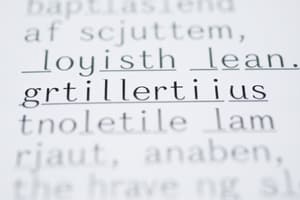Podcast
Questions and Answers
What is the fundamental unit of language?
What is the fundamental unit of language?
- Idea
- Concept
- Term
- Word (correct)
What type of words require accompaniment by other words to be used as a term?
What type of words require accompaniment by other words to be used as a term?
- Abstract words
- Categorematic words
- Syncategorematic words (correct)
- Concrete words
What is the process of forming an idea in the mind?
What is the process of forming an idea in the mind?
- Simple apprehension (correct)
- Complex apprehension
- Intellectual representation
- Abstract thinking
What is a term in the context of logic?
What is a term in the context of logic?
What is the significance of a term in a proposition?
What is the significance of a term in a proposition?
What does a term denote in categorical propositions?
What does a term denote in categorical propositions?
What is the principle that governs the relationship between comprehension and extension of terms?
What is the principle that governs the relationship between comprehension and extension of terms?
What are terms that are absolutely opposed to each other in meaning called?
What are terms that are absolutely opposed to each other in meaning called?
What is an example of Contrary Terms?
What is an example of Contrary Terms?
What are terms that consists of more than one word called?
What are terms that consists of more than one word called?
What is a characteristic of Universal Terms?
What is a characteristic of Universal Terms?
What is an example of Simple Terms?
What is an example of Simple Terms?
What is the term that refers to the meaning or quality of a term?
What is the term that refers to the meaning or quality of a term?
Which term is said to have the same meaning when applied to different objects or individuals?
Which term is said to have the same meaning when applied to different objects or individuals?
What is the term that refers to the objects, quantity, or number of a term?
What is the term that refers to the objects, quantity, or number of a term?
Which term is said to have a partly the same and partly different meaning when applied to different objects or individuals?
Which term is said to have a partly the same and partly different meaning when applied to different objects or individuals?
What is the term that applies to a specific or definite individual member of a class or group?
What is the term that applies to a specific or definite individual member of a class or group?
Which term is said to have a different meaning when applied to different objects or individuals?
Which term is said to have a different meaning when applied to different objects or individuals?
Flashcards are hidden until you start studying
Study Notes
Group Activity Terms
- A term is an essential component of a proposition, making its treatment fundamental in the science of logic.
- A word is a basic unit of language, composed of different letters.
Categorematic and Syncategorematic Words
- Categorematic words are those that can be used as a term without being accompanied by any other word.
- Syncategorematic words are those that can be used as a term in conjunction with other words.
Idea and Term
- An idea is an intellectual representation or image of the thing in the real world, which is abstract, immaterial, and intelligible.
- The formation of an idea in the mind involves the process of simple apprehension.
- A term is a word or group of words that signifies an idea in the mind and the object it represents.
Characteristics of Terms
- A term is a word or group of words.
- A term is a conventional sign.
- A term is categorical, denoting a category or class of objects.
Comprehension and Extension of Terms
- Universal terms apply to all members of a class without exception.
- The relationship between comprehension and extension of terms is inversely proportional, governed by the principle: "when the comprehension is increased, the extension decreases; and when the extension is increased, the comprehension decreases."
Classification of Terms
- Contradictory terms are absolutely opposed to each other in meaning, with no possible middle ground.
- Contrary terms are opposed to each other, representing extremes in a particular order or class, with a possible middle ground or alternative.
Composition of Terms
- Simple terms consist of only a single word.
- Compound terms consist of more than one word.
Quality of Terms
- Univocal terms have the same meaning when predicated to different objects or individuals.
- Equivocal terms have a changing meaning when predicated to different objects or individuals.
- Analogous terms have a meaning that is partly the same and partly different when predicated to different objects or individuals.
Extension of Terms
- Singular terms apply to a specific or definite individual member of a class or group.
- Particular terms apply to some portion of a class, with "some" as the standard word attached to the term.
Studying That Suits You
Use AI to generate personalized quizzes and flashcards to suit your learning preferences.



